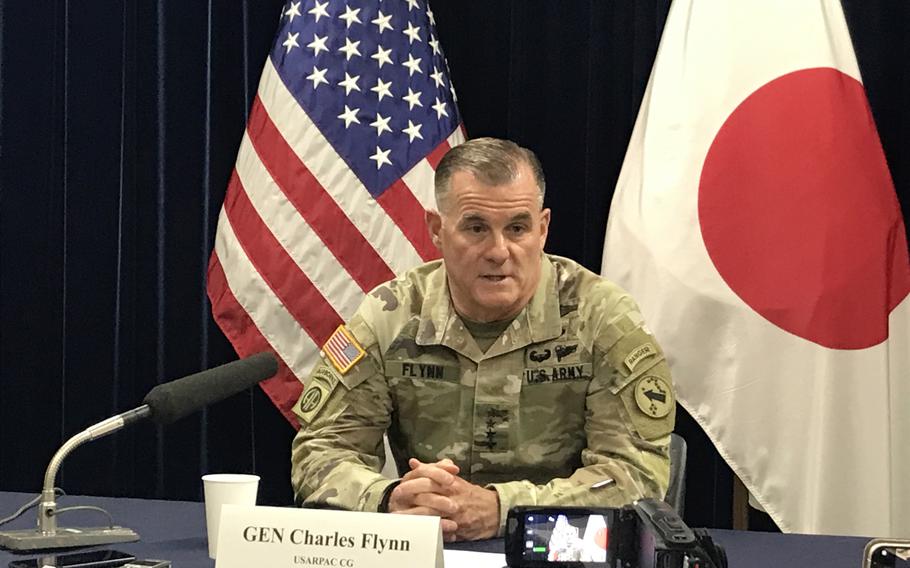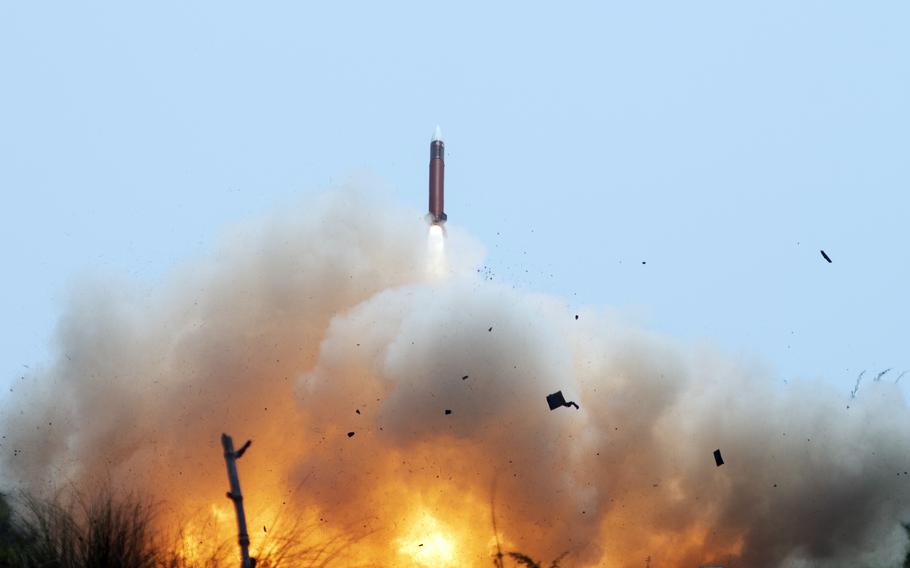
U.S. Army Pacific commander Gen. Charles Flynn speaks to reporters during a media roundtable at U.S. Embassy Tokyo, Wednesday, April 3, 2024. (Seth Robson/Stars and Stripes)
TOKYO — A recent poll suggests China is the popular choice in Southeast Asia, but the United States still has the cooperation of the region’s military forces, the commander of U.S. Army Pacific said Wednesday.
Growing numbers of participants in annual, U.S.-led military exercises demonstrates that U.S. military engagement in the region is expanding, Gen. Charles Flynn said during a roundtable discussion at U.S. Embassy Tokyo.
“What I see, at least with the army forces leadership and formations, is there is a continued and steady increase in multilateral and multinational work together,” he told reporters.
China is considered the most influential economic and political-strategic power in the region, outpacing the U.S. by significant margins, according to the annual State of Southeast Asia survey published Tuesday by the Association of Southeast Asian Nations Studies Centre — Yusof Ishak Institute in Singapore.
Just over half the poll’s 2,000 respondents prefer China if the region is forced to align itself in the ongoing U.S.-China rivalry. But many indicated an independent stance is preferable to embracing either power.
“The US as a choice dropped from 61.1% in the previous year to 49.5%,” the survey states. “Close to half of the respondents (46.8%) believe that ASEAN should enhance its resilience and unity to fend off pressures from the two major powers.”

A Patriot missile is fired during a Balikatan drill at Naval Station Leovigildo Gantioqui in San Antonio, Philippines, April 25, 2023. (Jonathan Snyder/Stars and Stripes)
Flynn pointed to Balikatan, an exercise scheduled to bring 16,000 U.S. and Filipino troops together in the Philippines from April 22 to May 9, as an example of growing U.S. influence.
Other exercises, including Super Garuda Shield in Indonesia and Talisman Sabre in Australia, have grown to include not just the U.S. and host nations but forces and observers from 14 or 15 other nations at each, including some from Southeast Asia, Flynn added.
“Balikatan is in two to three weeks, and I expect the number of countries sending formations or observers to be in the teens,” he said.
The ASEAN poll shows that Filipinos bucked the trend, with support for the U.S. as a preferred partner growing from 78.8% to 83.3% since last year and support for China falling from 21.2% to 16.7%.
The results come during increased tension between Manila and Beijing.
In recent months, Chinese coast guard and maritime militia have tried unsuccessfully to block Philippine vessels resupplying the BRP Sierra Madre. The grounded World War II-era ship serves as a territorial outpost at Second Thomas Shoal, a disputed reef in the South China Sea.
China’s military has been on a dangerous trajectory for the past decade, Flynn said.
Its aggressive behavior, including recent actions off the Philippines’ western coast is “illustrative of that irresponsible behavior,” he said.
U.S. Army I Corps, based at Joint Base Lewis-McChord, Wash., will reposition as a Combined Joint Task Force in the Philippines during Balikatan, Flynn said. I Corps in March participated in the Cobra Gold exercise in Thailand, the largest military training in mainland Asia. China took part in a humanitarian-aid project during the exercise.
Balikatan will also involve troops of the 25th Infantry Division, based at Schofield Barracks, Hawaii, along with security force assistance, combat aviation, engineer and multidomain task force specialists, Flynn said.
The soldiers will work from Philippine bases that permit access by American forces under the Enhanced Defense Cooperation Agreement; they will conduct combined arms and field training and a staff exercise during Balikatan, Flynn said.